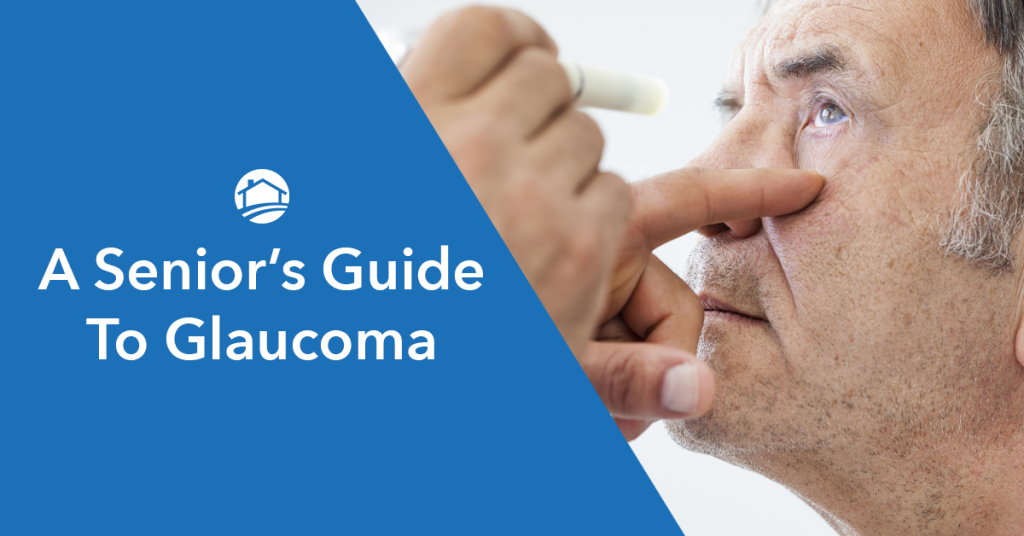Glaucoma can affect anyone, no matter their age or background, so learning the warning signs and treatment options is so important. Check out what we’ve developed as a senior’s guide to glaucoma–we want to be a resource for you!
For more information on how we can help seniors with various health conditions, check out our Who We Help page here!
Risk Factors
Anyone can suffer from glaucoma. However, it most commonly affects those with African American and Mexican American heritage. Glaucoma frequently runs in families and often develops after a person reaches the age of 60. In addition to family history and age, factors such as low blood pressure, nearsightedness (myopia), diabetes, and previous eye injuries can increase someone’s risk of developing glaucoma. Long exposure to the steroid hormone, cortisone, can also increase your risk. Read the rest of A Senior’s Guide To Glaucoma below in order to find treatment and prevention plans for you!
Glaucoma Explained
The fluid in our eyes maintains a constant pressure within our eyeball. When the valve that monitors fluid and pressure malfunctions, added pressure damages the optic nerve and reduces a person’s vision. This process rarely hurts and the vision loss seems normal because it happens over a long period of time. The faster a person catches the condition, the more likely a successful treatment method can slow the process.
Common Types
The most common types of glaucoma are listed below:
- Open-angle glaucoma: This type of glaucoma affects 1% of all Americans, making it the most common. It results in a slow, painless loss of peripheral vision.
- Secondary glaucoma: People with this type of glaucoma notice that their peripheral vision gradually narrows. Their field of vision may look as though they are seeing through a paper towel tube.
- Low tension or normal-tension glaucoma: This is the most challenging type to detect because pressure levels remain normal. Experts attribute this quality to impaired blood flow to the optic nerve.
- Angle-closure glaucoma: This type of glaucoma acts quickly. Intraocular pressure becomes too high and the iris is forced against the part of the eye that blocks drainage. As the drainage becomes completely blocked, an acute glaucoma attack occurs, often resulting in sudden vision loss.
The following types of glaucoma still affect many seniors in the US, though less commonly:
- Pigmentary glaucoma: This type affects men most frequently and can begin in a person’s early twenties. A person is at higher risk if he or she is nearsighted.
- Trauma-related glaucoma: Any serious blow to the eye, such as a burn or penetrating injury, can cause this type of glaucoma.
Detecting Glaucoma
After the age of 55, doctors recommend that you schedule an annual eye exam, especially if there is a family history of glaucoma. Only a full vision eye exam, including tonometry, a visual field exam, visual acuity assessment, and a dilated eye exam can detect glaucoma.
- Tonometry measures ocular pressure by determining the resistance of the cornea to indentation, usually with the dreaded “puff of air test” at the eye.
- A visual field exam tests a person’s full field of vision by asking if he or she can see a series of objects or flashes of light in various locations.
- The visual acuity exam uses the familiar eye chart with the tumbling E’s.
- During a dilated eye exam, drops are put in the eyes to dilate (widen) the pupils so that the physician can examine the retina and optic nerve. These drops may cause blurring of vision for several hours, although most people can still see afterward.
Treating Glaucoma
No cure exists for glaucoma. All types of glaucoma are controlled with eye drops, medications, and surgery. Commonly prescribed medications include:
- Alpha-adrenergic agonists
- Beta-blockers
- Carbonic anhydrase inhibitors
Laser surgery is another treatment option for glaucoma in seniors. Using a laser, part of the anterior chamber within the eye is reworked to make it easier for the fluid to exit the eye. Usually, the patient will also continue to take glaucoma medications following the surgery, as well as monitor intraocular pressure with an annual exam.
Helping Seniors with Glaucoma
In order to provide a senior’s guide to glaucoma, we also have to provide resources for the people who help them every day! You may need to help your senior remember to take their medication exactly as prescribed and encourage them to review medication each year with their optometrist.
Some drugs stop working overtime or negatively interact with other prescriptions. Only a physician can appropriately monitor glaucoma and medications to make necessary changes.
Often seniors will need help with eye drops because of tremors, fine motor control issues, or memory loss. Special devices can help make the application of drops easier.
Preventing Glaucoma
No one knows exactly what causes glaucoma in seniors. However, many experts believe in the benefits of a diet rich in omega-3 fatty acids. Traditional Western diets are low in omega-3 fatty acids, so encourage your senior to incorporate wild salmon, tuna, herring, mackerel, anchovies, and sardines within his or her diet. All of these options provide good natural sources of omega-3 fatty acids. Fish oil supplements are also high in omega-3 fatty acids.
However, the single most important thing your senior can do to prevent vision loss from glaucoma is to schedule regular and complete eye exams every year.
Caregivers, your seniors are so grateful for your help! Please let them know how important it is to schedule regular eye exams and keep up with their medications!
Read this resource from the American Academy of Ophthalmology for more clinical information on glaucoma.
- How Senior Home Care Supports Independence for Elderly Loves Ones in Brentwood, Tennessee - November 8, 2024
- Public Health in the Age of COVID - September 15, 2021
- World Elder Abuse Day June 15, 2021 - June 28, 2021




